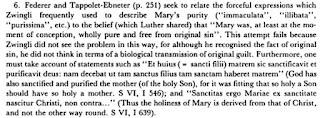While searching around, I found some interesting comments from Zwingli's Thought: New Perspectives By Gottfried Wilhelm Locher in regard to Zwingli and the immaculate conception. It says "There is no trace in Zwingli of the doctrine of the 'immaculate conception'..."
The page can be found on Google Books. Footnote #6 is quite interesting, particularly "Thus the holiness of Mary is serviced from that of Christ, and not the other way round." I'm curious as to which conception is in mind when the author states, "Mary was, at least at the moment of conception, wholly pure and free from original sin." With Luther, such a comment usually refers to the conception of Christ. I'm curious if this is the case with Zwingli as well.
Another book states, "Constantly as he insisted upon the certainty of the perpetual virginity of the mother of God he accepted neither her immaculate conception nor her assumption." Another book states, "The doctrine of the Immaculate Conception was disregarded by Zwingli..."
That the early Reformers were devoted to Mary (or held distinctive Roman Catholic beliefs later rejected by Protestants) has been a favorite argument of Roman Catholic apologetics. While the conclusions of the authors mentioned above are intriguing, they are not primary sources. A primary context needs to be exegeted. It does though make me wonder if the same thing is happening to Zwingli's Mariology as that which happened to Luther's Mariology: are Roman Catholic apologists reading history the way they want to, rather than actually tracking down the evidence to see what's there?








4 comments:
It seems for me, at least, that Zwingli believed in the perpetual virginity of Mary...
To digress a bit I have come to the conclusion about the fruit of original sin is equated with one's death not with one's sins. There are a few examples of people God reckoned righteous (Noah, Job and Daniel) but these I suppose because of the Faith they lived by? But then we have Saul/Paul writing he lived "blameless" according to the Law and then there is Simeon who met Mary with baby Jesus in the Temple, or, Annas, both seemed to live "sinless" lives in the sense of not being overtly sinful in action their entire lives yet they all tasted the fruit of original sin=DEATH!
That's what it seems to me the question about original sin should center around?
We have only two cases, Enoch and Elijah, who apparently did not go the way of all flesh. Other than those two, all of us will succumb to that ancient right of passage, too, thanks to Adam partaking of the fruit of the knowledge of good and evil.
In one sense I believe this rite of passage to not be able to live forever, but to live with God in His Eternal Kingdom, is the merciful thing seeing those odd words at the end of Genesis 3.
Apparently now that Adam and Eve had the knowledge of good and evil having partook of the fruit of the Tree of Life would not be a good thing for them or us, their posterity, seeing they and we would then live with that knowledge forever!
We have all sinned and fallen short of the Righteousness of God. To die in our sins with the knowledge of good and evil would not be a good thing for the Elect, that is, to be dwelling in the Kingdom of God's Eternal Heaven forever I suppose? The non-elect die with this knowledge and dwell in the lake of fire. The Elect, washed clean from the stain of sin by the Blood of Jesus to dwell in His Kingdom forever after is our hope.
It seems for me, at least, that Zwingli believed in the perpetual virginity of Mary...
What I would be interested in researching at some point is the context in which Zwingli expressed such a belief (the 16th Century), and then compare it to the way current Roman apologists accept the belief.
are Roman Catholic apologists reading history the way they want to, rather than actually tracking down the evidence to see what's there?
Don't answer that!
Post a Comment